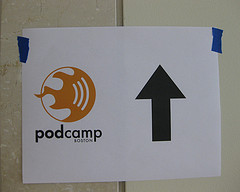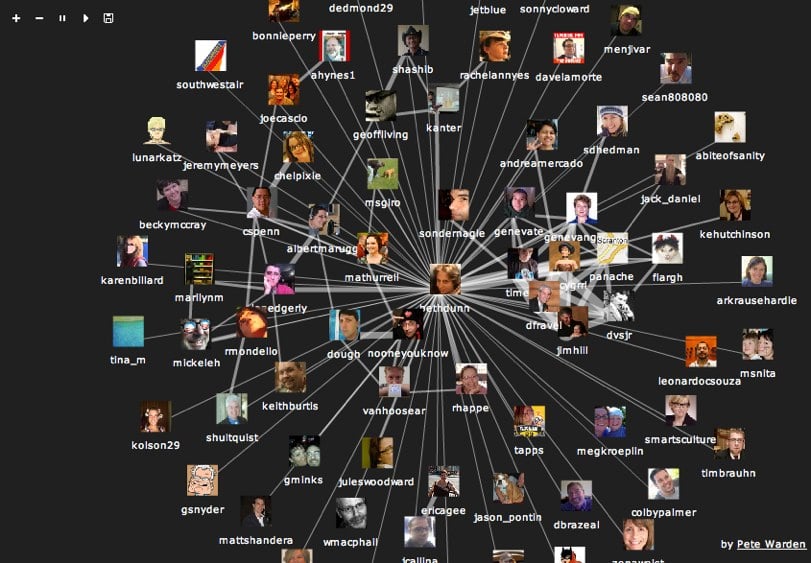
creativity, play, and productivity

Past editions of Voice Mail, Beth Dunn's newsletter on writing and voice.

I just came across this article by Rosabeth Moss Kanter of Harvard Business School, in which she makes the case for enabling regular office workers to work from home one day a week. She makes all the right points -- about how this would cut down on traffic, emissions, hassle, sick days, etc. etc. -- but I really focused in on what she said were the obstacles, or barriers, to making this change.
She lists:
What interests me about this list is how similar it is to the attributes necessary for successfully integrating social media into an organization.
Rachel Happe of The Community Roundtable touches on many of these attributes when she talks about their Community Maturity Model. Her model provides a very clear way of thinking about how ready your organization might be for "socialization," by looking at your organization's
Going back to RM Kanter's list of barriers, I would assign all of these to Rachel's category of culture. To me, this is the category that touches on and cuts through all the other categories. An organization's culture both determines and is determined by the organization's leadership, who are largely responsible for devising strategy and the policies & governance that are supposed to support that strategy. Even the tools that are used and the measurements that are valued are determined by the organization's culture.
What it comes down to is this:
Is your organization based on a culture of fear or a culture of trust?
Now, sure, few organizations will jump up and say "Fear! We base all our actions on fear. Thanks for helping us clarify that."
But fear is what lies behind distrust. And distrust means that managers don't trust their employees to be accountable, collaborative, or responsible.
Does this look like your organization?
In terms of working from home:
In terms of socializing the organization, opening it up to the use of social media:
It means that they don't trust their workers.
When I wrote last spring about the importance of creating an organizational social media policy, I commented on how trust should already be the cornerstone of an organization's relationships with its employees anyway. I mean, you trust them with so much already:
It’s been said that companies would do well to remember that they have to trust their employees on these issues every day already — every time they talk to a customer, deal with a member, gab with a vendor, or work with a sponsor, you are trusting them to represent you and your brand responsibly, with discretion and integrity.
If you haven’t hired people you can trust to behave like responsible adults, then there is a deeper problem.
If your organizational culture is based on fear, then there is a much deeper problem. You might like to call it being "risk-averse," but please believe me: this will cripple your organization in the days and months to come.

Podcamp Boston 4 just ended, which means, really, that another year has just begun.
Podcamp is always a profoundly motivating and inspiring experience for me, and I have actually begun to track major changes in my life based on how they have spun around the axis of Podcamp, which always seems to serve as a hinge in time, often even as an active wedge for change.
So, to paraphrase a friend's totally legitimate question to me this weekend:
What is the point of Podcamp?
I am always somewhat taken aback when someone says something about Podcamp being mostly about podcasting; I had sort of forgotten that that was the weekend's alleged subject matter. And in a way, I guess it is about podcasting, along with other related topics. If you were to look at a list of the session topics, you might come away thinking that the conference is nothing but the nuts and bolts of podcasting, SEO, Twitter, and other "social media" type esoterica.
And, to a certain extent, it is.
But only on the surface. For me, podcasting is really just a front for Podcamp, it's only the skin of it, it's just the flashy neon sign that hangs out in front while the real card game goes on inside.
In fact, Chris Penn, one of Podcamp's founders, writes eloquently about this essential nature of Podcamp here. And it's something of what I touched on when I reflected on my experience at NewBCamp in Providence last year.
There's something a bit more profound going on at Podcamp, and it has nothing to do with learning about what type of microphone works best for two-person interviews.
Chris Penn articulates it as a sense that we are capable of greater things, that we can in fact do things that other people tell us are impossible, improbable, and even unseemly. It's true: there's something unbelievably powerful about how Podcamps encourage everyone to participate -- but not just to participate, to pass it on, to encourage others to participate as well. It's all part of the "Everyone is a Rockstar" ethos of Podcamp, and it's sort of breathtaking to watch it in action.
Example 1
At one of the sessions I attended, a packed room of people sat and waited patiently for the presenter to arrive and begin. When it was ten minutes after starting time, somebody suggested that perhaps the presenter was a no-show.
Suddenly, four people were at the front of the room, volunteering to improvise a presentation on the exact topic that was originally scheduled for that session. They worked out a division of labor, each of them agreeing to talk about an aspect of the topic that they were particularly strong in. Within two minutes, we were up and running with, I am convinced, an even stronger presentation than the one that had been planned.
I told this story to Chris Brogan (the other co-founder of podcamp along with Chris Penn) at lunch, and he just smiled and said That's so Podcamp.
Example 2
I went to several of the bigger sessions in the main ballroom, where the topics were huge and diffuse, things like "What's on our minds now?" Sounds like you get to listen in on a conversation between the big thinkers in the field of social media, right? Hear what they think is coming next, what they are sniffing in the air, with their special powers of discernment and understanding...
In fact, what these sessions consisted of was a Phil Donohue-style session of passing the microphone around from one participant to the other, giving anyone who wanted to the opportunity to speak their mind. Some people talked about marketing trends, while others talked about how sick they were of hearing about marketing, when it was relationships that really mattered; some talked about iPhone apps they would like to see developed, while others talked about the everyday violations of online data privacy and security that iPhones can now enable; some talked about how we all need to cool it on our collective narcissism and obsession with personal branding, while others suggested that we would be sunk if we didn't work hard on our personal branding over the next year.
Fascinating.
Example 3
In his reflections on this year's Podcamp, Chris Penn wrote about breaking the shackles of your own potential, about swinging away at our own "chains of doubt and fear." At last year's Podcamp, I was still dithering over whether or not I would jump with both feet into an MBA program that would require an hour-and-a-half commute each way, that would challenge my self-concept in ways that made me more than a little uncomfortable, and that I suspected would require me to leave my job and find new sources of income that didn't come with the comfort and security of a salary. When I attended Podcamp last summer, I spoke with several people who, each in their own way, helped me make the hard decision to jump, and jump wholeheartedly, without fear or hesitation.
When I ran into one of those friends again at this summer's Podcamp, he asked me how my leap was going, and where it had taken me. When I told him, he said that I should consider myself Exhibit A of how change can bring us places we never thought we could go, and how it can help us cover distances in a year that we thought would take a lifetime.
My story of change is somewhat similar to the one Chris tells about Chel, who was the lead organizer for Podcamp this year. Chel is really Exhibit A, but there's no reason why we all can't be.
So what is the point of Podcamp?
People.
I am not saying that Podcamp is about some airy concept of personal change and growth and self-fulfillment. It's much, much scarier than that. Podcamp is about taking responsibility for your own experience. It's about choosing to be the author of your own life, with all the blame and glory that goes along with that. It's about realizing that your responsibility for your self is not just a duty to be all you can be, or whatever, but it's also a duty to the community.
Because we need you to do that awesome thing you've been considering, even if it is just a Big Huge Hammock in Boston Common.
Because we need you to remind us that our lives can be centered around work that we are passionate about.
Because we need to see you do the impossible, so that we can begin to believe that we can, too.


Seventy years ago today, Lou Gehrig made his farewell speech at Yankee Stadium. Most people watching the game that day barely understood how ill he was, or that his disease was already rapidly devouring his strong, athletic body with ravenous greed. Within a year, he would be unable to walk. Within two, he would be dead.

Which do you prefer, crossword puzzles or scrabble?

A good friend of mine has this daughter, see. And this daughter is just insanely bright and accomplished. And a senior in high school. So she's been spending this spring wondering where she will spend the next four years of her life. Fun times.
I love New York:
The Lost Tribes of New York City from Carolyn London on Vimeo.
This semester, I started a weekly speaker series at school called Little Known Fact. Each week, a current MBA student at the Simmons School of Management gives a brief, informal presentation on some topic that she is passionate about -- something that wouldn't come up in everyday classroom conversation.

(Note: If you're looking for the post "What does Twitter Look Like?" then go here.)
...
Well this is a rather amazing tool.
Marshall Kirkpatrick's recent piece on ReadWriteWeb about The Inner Circle of 10 Geek Heroes listed me as a person with whom the remarkable Beth Kanter interacts often on Twitter. Which surprised me a bit, only because I have been totally submerged in school for the last seven months getting an MBA at Simmons in Boston, and have radically curtailed my twitter usage (and bloggage) as a result of the intense and all-consuming workload of an accelerated MBA program. So I thought I was pretty well out of the loop -- things move fast on Twitter, and seem to have been moving even faster of late.
I love the visualization of my network that this tool provides -- you can tweak it in all sorts of ways, too, to find out who lives where (if your network is particularly complex geographically, as mine is), what they talk about, and what their network maps look like.
One of the most common things I hear in conversation with other Twitterers is Well, do you know so-and-so? And the answer is no, more often than you might think. Because Twitter provides you with a personalized view of a very broad and multi-layered conversation, it is easy to allow yourself to believe that your view is at all similar to the view of others... just because you share a few connections.
It's pretty worthwhile, I think, to take a moment and click on some of your friends' links within your network map -- see what Twitter looks like from where they sit, and maybe see what angles you've been missing.